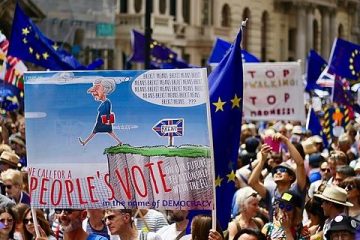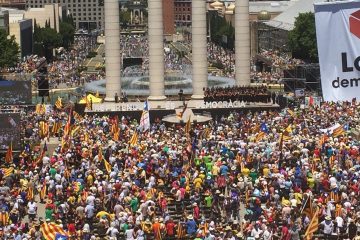
Brexit and a “People’s Vote” – what would Wittgenstein do?
Calls for a second referendum on EU membership have been growing louder without, however, properly making the case for it. They fail to address the heart of the matter: how to show adequate respect for the democratic result of the 2016 referendum on EU membership whilst making the case for a new referendum. Ultimately, the case for a second referendum requires a compelling justification for challenging the first. The real question that the proponents of a people’s vote must confront is whether the democratic process can be suspended without undermining its legitimacy. They need to be able to square the circle, because a democracy worth the name depends on the consistent application of its rules. The risk of violating consistency …

How did Voting on the Brexit Referendum Affect Voting on May’s Brexit Deal?
On January 15, 2019, Prime Minister Theresa May’s Brexit deal suffered a defeat of historic proportion in the House of Commons: 432 MPs voted against and 202 for the ‘EU Withdrawal Act’, with a staggering margin of 230 votes. But how do the MP positions on May’s deal compare with the constituency-level votes on the 2016 referendum? [i] Notably, almost all the intra-party variation in voting takes place on the Tories’ side of the aisle. Only 3 Labour MPs bucked the party line and voted for the deal, whereas 118 Tories voted against May’s proposal. The plot below shows the distribution of constituency vote on the Brexit referendum by MPs voting either for or against the Brexit deal. The graph …

Tracking the Twitter conversation on the Irish abortion referendum
In this article, we use TwitterTrails[i] to follow and analyse the online conversation about the contentious Irish abortion referendum. This referendum offers a useful opportunity for study because it is one of the first referendums in a Western democracy since 2016, when the phenomenon of misinformation on the Internet first gained prominence. Following the revelations of foreign social media interference during the 2016 U.S. presidential election, the Irish referendum was widely seen as a test for social media companies’ ability to protect voters from election meddling.[ii] Some social media companies, such as Facebook and Google, had taken action and previously introduced tools to improve transparency. Indeed, eventually, Facebook blocked political advertising from groups outside Ireland altogether. Google soon joined this …

The Catalan process and the dispute over ‘democracy’ in Spain
More than two million Catalans voted on October 1st in a referendum on self-determination previously declared illegal by the Spanish constitutional court and violently repressed by the Spanish government led by Mariano Rajoy. The response of the Spanish government has been condemned internationally. For instance, Amnesty International described the action of the Spanish police forces in Catalonia as “excessive and disproportionate”. Despite prohibition and violence, which affected participation and the accurate counting of the votes, the referendum took place thanks mostly to the organisation, efforts, and inventiveness of different sectors of the Catalan civil society. In the thousands, citizens engaged in a strategy of peaceful resistance against the aggression of the central state. The ‘yes’ option won with 90% of …

Scotland After the Independence Referendum: An interview with Jim Gallagher
In this interview, Jim Gallagher discusses the political and constitutional issues arising from the 2014 Scottish Independence Referendum. Professor Jim Gallagher was senior advisor to the Prime Minister on devolution strategy (2007-2010) and was Secretary of the Calman Commission on Scottish Devolution. He is Visiting Professor at the University of Glasgow and Associate Member at Nuffield College, Oxford. An expert advisor to the Scottish Parliament, he was appointed to advise the committee considering the Scotland Act 2016. (The interview was recorded before the UK’s EU Referendum on 23 June 2016.)

Brexit and Political Education: Ariadne’s Thread Leads to Leave
An impressive list of academics, including seven Oxford faculty members, signed a petition in mid-June calling for new strategies to deal with misinformation. It makes very good sense to desire competent opinion as opposed to misinformation, and to argue that democratic legitimacy of the referendum’s outcome in some sense rests upon informed choice. (A specific example of a helpful intervention is this letter from the UK Statistics Authority challenging the “potentially misleading” statement of Nigel Farage about the “independence dividend” of Brexit.) These epistemic interventions need to be given more thought, but they all share the same classic problem: Who shall watch the watchers? While oversight and accountability genuinely help the democratic process, representing the proper style of character and …

Why did the UK vote to leave the European Union?
It is not hard to see why Leave won. Evidence from numerous opinion polls showed that there was a clear majority for Leave on the basis of concerns about immigration and beliefs that leaving would reduce immigration. Moreover the same opinion polls showed us that there was no compensating majority who believed that the UK would be worse off if we left. Still less did people feel that they personally would be financially worse off. For further details see here. Although it should not have come as a surprise that Leave won, the result was close enough that it could easily have gone the other way. There will be much debate as to whether the Remain side could have made their …









